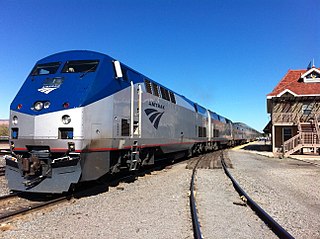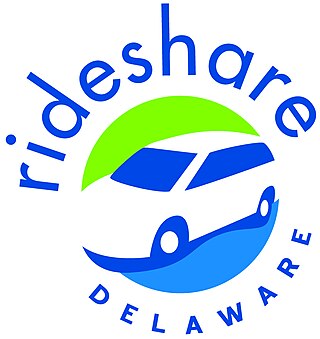Vanpools or Vanpooling is an element of the transit system that allow groups of people to share the ride similar to a carpool, but on a larger scale with concurrent savings in fuel and vehicle operating costs and thus usually a lower cost to the rider. Vanpools have a lower operating and capital cost than most transit vehicles in the United States, but due to their relatively low capacity, vanpools often require subsidies comparable to conventional bus service. [1]
Vehicles may be provided by individuals, individuals in cooperation with various public and private support programs, through a program operated by or on behalf of an element of government, or a program operated by or on behalf of an employer.
The key concept is that people share the ride from home or one or more common meeting locations and travel together to a common destination or work center.
A number of programs exist (within the United States) to help lower the cost of that shared ride to the end user. Among these are traditional funding available to public agencies, public-private partnerships, and the Best Work Places for Commuters [2] (Commuter Choice Programs). A tax benefit is available under 26 U.S.C. §132(f) Qualified Transportation Fringe Benefit allowances. These public transportation programs seek to reduce the number of cars on the road (with all the attendant environmental benefits).
Additional benefits include:
In many cases, an employer may elect to subsidize the cost of the vanpool and the vehicles' maintenance. In some cases, the vehicles are provided and maintained by the municipality; in others in partnership with or by a third-party provider. For example, UCLA operates an extensive network of vans, in which faculty, staff and students are eligible for discounted rates, although anyone commuting to the Westwood area is allowed to participate, with drivers receiving the highest discounts. The vans are centrally maintained, fueled, and cleaned.
The King County Metro Vanpool Program [3] is a successful demand responsive transport program in the Puget Sound area, specifically in King County, Washington. Another successful program is operated by Pace in Illinois.
Vanpooling was begun in the early nineteen seventies by a company called People’s Vans by founder Victor Paglia in 1972 to address the need for people to acquire affordable travel cross country. Reference May 14 article in the Travel section of the New York Times [4]
The oldest multi-employer vanpool program in the country is in Treasure Valley, Idaho. For over 30 years Ada County Highway District’s Commuteride [5] Vanpools have been crisscrossing the Valley helping commuters go to and from work, with their numerous vanpool routes traveling throughout the Treasure Valley. The Vanpools also service the Military at Gowen Field and Mountain Home Air Force Base (MHAFB) with multiple routes to and from Ada and Canyon County. ACHD Commuteride serves the cities, Boise, Meridian, Kuna, Garden City, Eagle and Star as well as Ada County.
Private firms operate vanpools for individuals, as well as in cooperation with employers or under contract.
Another notable example is Swvl, a NASDAQ publicly held company, that is providing Vanpooling services in 18 countries.
{{cite web}}: CS1 maint: archived copy as title (link)
The Southeastern Pennsylvania Transportation Authority (SEPTA) is a regional public transportation authority that operates bus, rapid transit, commuter rail, light rail, and electric trolleybus services for nearly four million people in five counties in and around Philadelphia, Pennsylvania. It also manages projects that maintain, replace and expand its infrastructure, facilities and vehicles.

The Research Triangle Regional Public Transportation Authority, known as GoTriangle, provides regional bus service to the Research Triangle region of North Carolina in Wake, Durham, and Orange counties. The GoTriangle name was adopted in 2015 as part of the consolidated GoTransit branding scheme for the Triangle. In 2022, the system had a ridership of 1,616,600, or about 5,300 per weekday as of the second quarter of 2023.

Community Transit (CT) is the public transit authority of Snohomish County, Washington, United States, excluding the city of Everett, in the Seattle metropolitan area. It operates local bus, paratransit and vanpool service within Snohomish County, as well as commuter buses to Downtown Seattle and Northgate station. CT is publicly funded, financed through sales taxes, and farebox revenue, with an operating budget of $133.2 million. In 2022, the system had a ridership of 5,788,700, or about 23,600 per weekday as of the second quarter of 2023, placing it fourth among transit agencies in the Puget Sound region. The city of Everett, which serves as the county seat, is served by Everett Transit, a municipal transit system.

Lynx is a transit system serving the greater Orlando, Florida area. Operated by the Central Florida Regional Transportation Authority, it provides bus, curb-to-curb, and paratransit services in three counties: Orange, Seminole, and Osceola. Bus routes are referred to as Links.

Pace is the suburban bus and regional paratransit division of the Regional Transportation Authority serving the Chicago metropolitan area. It was created in 1983 by the RTA Act, which established the formula that provides funding to the CTA, Metra, and Pace. The various agencies providing bus service in the Chicago suburbs were merged under the Suburban Bus Division, which rebranded as Pace in 1984. In 2022, Pace had 18.041 million riders.

Paratransit is the term used in North America, also known by other names such as community transport (UK), for transportation services that supplement fixed-route mass transit by providing individualized rides without fixed routes or timetables. Paratransit services may vary considerably on the degree of flexibility they provide their customers. At their simplest they may consist of a taxi or small bus that will run along a more or less defined route and then stop to pick up or discharge passengers on request. At the other end of the spectrum—fully demand responsive transport—the most flexible paratransit systems offer on-demand call-up door-to-door service from any origin to any destination in a service area. In addition to public transit agencies, paratransit services may be operated by community groups or not-for-profit organizations, and for-profit private companies or operators.

Golden Gate Transit (GGT) is a public transportation system serving the North Bay region of the San Francisco Bay Area in California, United States. It primarily serves Marin County, Sonoma County, and San Francisco, and also provides limited service to Contra Costa County. In 2022, Golden Gate Transit had a ridership of 1,205,100, or about 4,300 per weekday as of the second quarter of 2023.
The Valley Metro Regional Public Transportation Authority, more popularly known as Valley Metro, is the unified public brand of the regional transit system for the Phoenix metropolitan area. Within the system, it is divided between Valley Metro Bus, which runs all bus operations, and Valley Metro Rail, which is responsible for light rail operations in the Valley. In 2022, the combined bus and rail system had a ridership of 33,944,600, or about 108,400 per weekday as of the second quarter of 2023.

San Joaquin Regional Transit District is a transit district that provides bus service to the city of Stockton, California and the surrounding communities of Lodi, Ripon, Thornton, French Camp, Lathrop, Manteca, and Tracy. In 2022, the system had a ridership of 2,068,800, or about 8,200 per weekday as of the second quarter of 2023.

The Denton County Transportation Authority (DCTA) is the transit authority that operates in Denton County, Texas. It operates transit service in three cities within Denton County, as well as the A-train, a regional commuter rail line to Carrollton. In 2022, the system had a ridership of 2,124,700, or about 7,800 per weekday as of the second quarter of 2023.

The Riverside Transit Agency (RTA) is the main transit agency for western Riverside County, California, United States. RTA provides both local and regional services throughout the region with 39 fixed-routes, 9 CommuterLink routes, and Dial-A-Ride services using a fleet of 339 vehicles. In the cities of Corona, Beaumont and Banning, RTA coordinates regional services with municipal transit systems. In Riverside, RTA coordinates with the city's Riverside Special Services, which provides ADA complementary service to RTA's fixed-route services.
An employer in the United States may provide transportation benefits to their employees that are tax free up to a certain limit. Under the U.S. Internal Revenue Code section 132(a), the qualified transportation benefits are one of the eight types of statutory employee benefits that are excluded from gross income in calculating federal income tax. The qualified transportation benefits are transit passes, vanpooling, bicycling, and parking associated with these things.

The United States is serviced by a wide array of public transportation, including various forms of bus, rail, ferry, and sometimes, airline services. Most established public transit systems are located in central, urban areas where there is enough density and public demand to require public transportation. In more auto-centric suburban localities, public transit is normally, but not always, less frequent and less common. Most public transit services in the United States are either national, regional/commuter, or local, depending on the type of service. Sometimes "public transportation" in the United States is an umbrella term used synonymously with "alternative transportation", meaning any form of mobility that excludes driving alone by automobile. This can sometimes include carpooling, vanpooling, on-demand mobility, infrastructure that is oriented toward bicycles, and paratransit service.
CommuteSmart is a program of the Regional Planning Commission of Greater Birmingham, Alabama, which works with employers and commuters to reduce traffic congestion and improve air quality in Jefferson and Shelby Counties.

Shared transport or shared mobility is a transportation system where travelers share a vehicle either simultaneously as a group or over time as personal rental, and in the process share the cost of the journey, thus creating a hybrid between private vehicle use and mass or public transport. It is a transportation strategy that allows users to access transportation services on an as-needed basis. Shared mobility is an umbrella term that encompasses a variety of transportation modes including carsharing, Bicycle-sharing systems, ridesharing companies, carpools, and microtransit.

Yakima Transit is the primary provider of mass transportation in the city of Yakima, Washington. It was established in 1966, as Yakima City Lines, when the city of Yakima began funding the provision of transit service after the privately owned company that had been providing service went bankrupt.

RideShare Delaware is DART First State's program to reduce traffic and encourage alternative transportation arrangements. The program is supported by state and federal funds as part of Delaware's efforts to maintain air quality. RideShare works in partnership with local and regional agencies towards meeting Federal Air Quality Standards. It helps form both carpools and vanpools. It also offers special programs for students and Delaware employers.
Commute.org is the transportation demand management (TDM) agency for San Mateo County, California, United States. Structured as a public joint powers agency, Commute.org is governed by an 18-member board made up of elected officials from 17 member cities and towns as well as the County of San Mateo. In addition to the Board of Directors, there are also standing committees, Supervisory and Finance, which provide guidance and oversight to the agency.

The Mason Transit Authority (MTA), formerly the Mason County Transportation Authority, is the public transit authority of Mason County, Washington, United States. It operates free bus service within the county, connecting the city of Shelton, Hoodsport, Grapeview, Allyn, Belfair, the native tribal reservations of the Skokomish and Squaxin people, and paid commuter service to Olympia in Thurston County, Brinnon in Jefferson County, and Bremerton in Kitsap County. The agency also provides general public dial-a-ride service, operates a vanpool fleet, a worker/driver program that provides commuter service to the Puget Sound Naval Shipyard and Intermediate Maintenance Facility, volunteer driver program for senior transportation, a supplemental service that is an after school activity bus and a community van program.